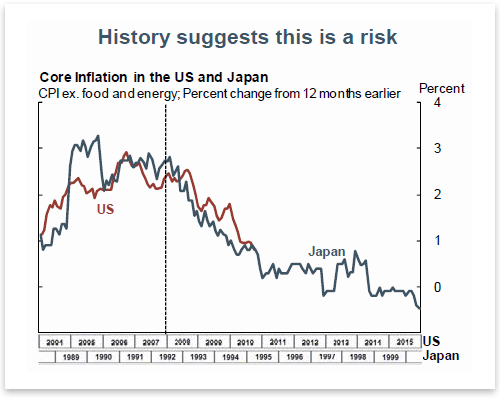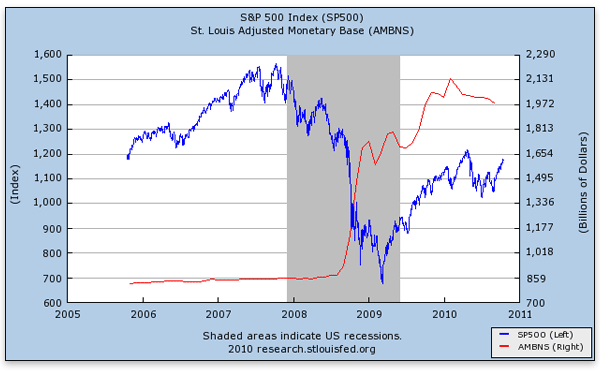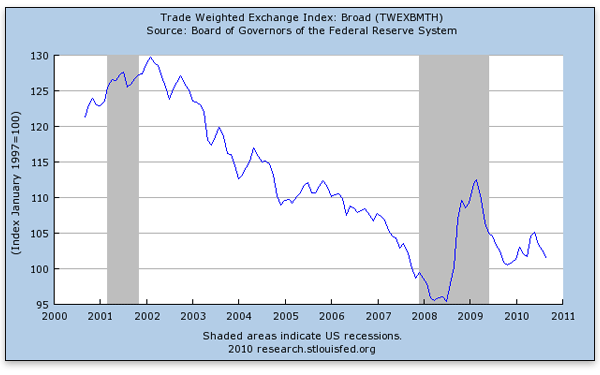Results 1 to 2 of 2
Thread Information
Users Browsing this Thread
There are currently 1 users browsing this thread. (0 members and 1 guests)
-
10-22-2010, 11:22 PM #1Senior Member


- Join Date
- May 2007
- Location
- South West Florida (Behind friendly lines but still in Occupied Territory)
- Posts
- 117,696
Avoiding The Trip to Q.E. Hell (Money Printing)
Avoiding The Trip to Q.E. Hell
Stock-Markets / Financial Markets 2010
Oct 22, 2010 - 01:29 PM
By: DeepCaster_LLC
âQuantitative Easing will some day be looked back upon as we now look at healing the sick through bleeding back in the 1700s. It is terrible economic policy, in fact should be considered criminal activity. Criminal for many reasons, such as debasing the value of the Dollar, but more importantly because it will be the final nail that destroys our economy. Wall Street is the key beneficiary. Households (consumers) which account for 70 percent of GDP, and small businesses, which account for 70 percent of employment, will not benefit from this fraudulent activity by the Federal Reserve. Where on earth is it right for someone to print trillions of Dollars out of thin air and then buy legitimate legally binding debt instruments in exchange for this printed paper? Anyone else doing this would be arrested and thrown in jail, with the key tossed into the deep blue sea&h
â¦letâs explore why it is a fraud on pretty much everyone except the sellers of the fixed income securities the Fed will be buying, primarily mega Wall Street firms, surrogates for the presidentâs Working Group (the Plunge Protection Team).
Bernanke suggested in his speech in Boston Friday on the subject of QE2, that he is justified in doing this to raise the inflation rate, which he believes is too low, and to increase employment. His economics are dead wrong. He believes it is perfectly appropriate to print trillions of dollars of U.S. Federal Reserve notes (Dollars) out of thin air, and then send this money from the Fedâs print shop across the invisible wall that separates the real economy from the non-economy (the Fed) to the lucky recipients of this cash. Here is the problem: This transfer of printed cash for securities in the market are normally known as open market operations, and the point of this exercise is to lower interest rates in the market to spur lending and filter cash through Wall Street intermediaries to banks to borrowers which would stimulate the economy and multiply the money supply in the market. However, short-term interest rates are already zero, and long-term interest rates are at historic lows. So QE2 will not reduce interest rates. Therefore it will not increase borrowing. Therefore it will not multiply the money supply or spur spending, ergo it will not improve GDP, will not help households or small businesses. The cash will simply move from the Fed to Wall Street where the mega banks can then leverage their investing and trading activities which will improve their short-term profits. There will be no trickle down benefits to households or small businesses. Without benefits to households or small businesses, there will be no improvement in spending (GDP) or employment.
What will result from QE2 is the devaluation of the U.S. Dollar as there will be too many Dollars floating around, in relation to hard assets such as precious metals, and foreign currencies. This reduces the purchasing power of Dollars, and reduces the value of cash in bank accounts. In other words, the consumer gets hurt.
The only way QE2 makes any sense at all is if it is conducted in such a way that the cash being printed by the Fed finds its way directly into the hands of households and small businesses, instead of Wall Street. The only way for this to happen is if newly issued debt from the U.S. Treasury from the Fed are sent directly to U.S. Households in the form of massive income tax rebate, and tax cutâ¦
If the intent of QE2 fails to include the household, it should not be allowed to happen. Congress must put a stop to QE2 immediately, and require a full explanation of the intended program before Bernanke destroys our economy. There should be an open debate in Congress on the merits of QE2, with testimony from all interested parties, in front of television cameras, for the American public to study before QE2 is effectuated. This is not something the Fed should conduct in secret. This is new turf, new territory for the Fed, and warrants careful scrutiny. The Justice Department needs to study if in fact the Fed is legally empowered to conduct QE2.âJoin our efforts to Secure America's Borders and End Illegal Immigration by Joining ALIPAC's E-Mail Alerts network (CLICK HERE)
-
10-22-2010, 11:26 PM #2Senior Member


- Join Date
- May 2007
- Location
- South West Florida (Behind friendly lines but still in Occupied Territory)
- Posts
- 117,696
QE2 and the Alleged Deflation Threat
Economics / Quantitative Easing
Oct 22, 2010 - 05:10 AM
By: Robert_Murphy
The markets and financial pundits are all abuzz over the prospect of another round of quantitative easing â "QE2" â in which the Fed may start buying yet another trillion dollars in assets after the elections. The justification for this massive bout of new inflation is, of course, the threat of deflation.
But if we actually look for ourselves, we see that prices are not falling. The Fed has already fueled another boom in various asset prices, just as it did when trying to provide a "soft landing" after the dot-com crash. The economy will never truly recover until the government and central bank let the market process take its course.
What Deflation?
It is curious that the financial press and many major economists are so convinced that the United States is on the edge of a deflationary cliff, by which they mean that various prices are about to tumble. On his blog, Paul Krugman has been beating this drum for years, and to prove the case he'll cite graphs like this:

Now I have not studied the case of Japan and its "lost decade" (and counting) so I can't responsibly comment on its experience. However, if Krugman's treatment of the "lessons" of Herbert Hoover is any indication, http://mises.org/daily/4350 I am skeptical that the Japanese episode really means what Krugman and other Keynesians keep telling us that it means.
There are several problems with the exclusive reliance on "core CPI" as a gauge of the tightness of monetary policy. First and most obvious, it is absurd to focus on the "core," which excludes food and energy prices. It is precisely these prices that are the most important for struggling households â and they are certainly not falling. According to the government's own figures, from September 2009 to September 2010, consumer food prices were up 1.4 percent, while consumer energy prices rose 5.4 percent.
Given that many households are either in financial distress or are terrified that they soon will be, is it really so surprising that consumers aren't spending gobs of money on things besides food and energy?
Another problem is that the Bureau of Labor Statistics can't very well document changes in product quality, which tend to mute price increases. To take an example offered by Silas Barta, the next time you open a cereal box, check out how flimsy the cardboard is; it was sturdier several years ago. I doubt that the government CPI figures take this sort of thing into account when telling us how weakly prices have responded to Bernanke's incredible bouts of money creation.
Looking at Other Prices
Besides nitpicking the construction of CPI data, there is the problem of focusing just on consumer prices in the first place. For example, according to the latest report of the Producer Price Index, in the last year prices for finished goods are up 4.0 percent, the prices for intermediate goods are up 5.6 percent, and prices for crude goods are up a whopping 20.3 percent.
But wait â there's more! According to economic theory, there's actually a very sensible reason to include asset prices when trying to determine the "cost of living." This is because most people don't want to live for a single day on milk and bread that they just bought at the grocery store. In principle an ideal price index would include prices for both present and future goods. As a convenient proxy, it makes sense to include asset prices when wondering whether monetary policy is causing the dollar to strengthen or weaken.
On that score, it certainly seems as if Bernanke's policies have been a "success," and that the United States is not heading into a "deflationary trap" as the pundits keep warning us. Gold keeps hitting new highs, and look at what happened to the stock market as Bernanke first bailed out the banks in late 2008, and then embarked on the first round of quantitative easing in early 2009:

The above chart should be frightening to anyone who believes that Greenspan's easy-money stance after the dot-com crash merely fueled the housing and stock bubbles. Bernanke is simply setting us up for another collapse.
Before closing, let's look at just one more graph. This time, it shows the strength of the US dollar compared to a basket of other currencies:

As the chart shows, the dollar briefly surged after the global financial panic in the fall of 2008. But since early 2009, the dollar has resumed its nearly decade-long slump. From its peak in 2002 to the present, according to this measure, the dollar has depreciated by more than 20 percent against other currencies.
Are we still so sure that our problem is a dollar that's too strong? Are we still so sure that more inflation is the answer to our economic woes?
Conclusion
It's true that some Austrian economists â including me â were warning that consumer prices would begin rising more quickly than they have so far. Even so, it is still hardly the case that the economy is on the verge of a "deflationary trap."
In any event, a free people have nothing to fear from falling prices. The market economy is quite resilient, if only the politicians and central bankers would let it operate. Nobody would be so foolish as to claim that the computer industry is stagnant because of constantly falling prices, and nobody breathes a sigh of relief that medical care keeps getting more expensive.
It was a futile attempt to evade a bad recession that led Alan Greenspan to blow up the housing bubble. Now Ben Bernanke is doing the same thing, only with far more intensity. If he really wanted to help the economy, Bernanke would stop debasing the dollar and would allow market prices to tell the truth.
http://www.marketoracle.co.uk/Article23684.htmlJoin our efforts to Secure America's Borders and End Illegal Immigration by Joining ALIPAC's E-Mail Alerts network (CLICK HERE)


 LinkBack URL
LinkBack URL About LinkBacks
About LinkBacks




 Reply With Quote
Reply With Quote

Report: On the Southern Border Invasion by MrCati
05-08-2024, 12:17 PM in Videos about Illegal Immigration, refugee programs, globalism, & socialism